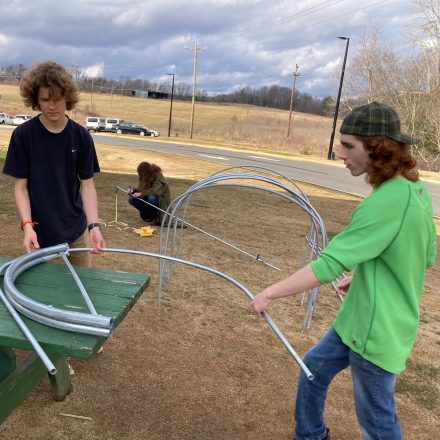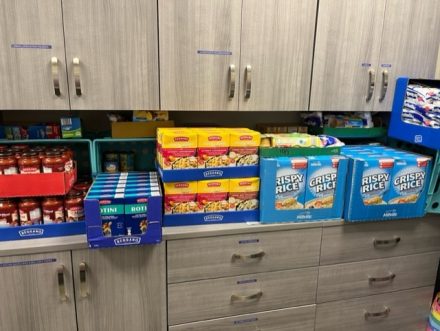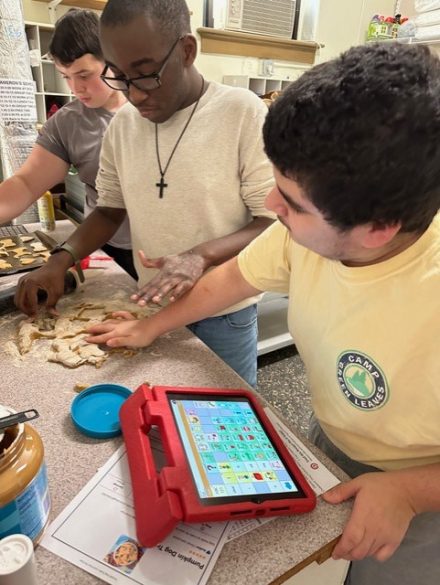The Office of Graduate Admissions has introduced Master's of Education Mini Grant projects to transform educational experiences in four classrooms within Alamance County.
In the heart of Alamance County, a spirit of innovation and community collaboration has been thriving, thanks to the implementation of the Elon University Master’s of Education (M.Ed.) Mini Grant projects. These initiatives, sponsored by the Office of Graduate Admissions, have brought forth transformative educational experiences in four local schools, fostering a deeper connection between students, educators, and the world around them.
The primary aim of the Elon M.Ed. Mini Grant is two-fold: advance the values upheld by Elon’s M.Ed. program, including place-based education, project-based learning, social justice in the classroom and to raise awareness of its mission within Alamance County. With grants of up to $1,200 awarded to each selected school, educators were empowered to turn their visionary ideas into tangible reality, enriching the educational landscape of their classrooms and communities.
Rickeya Jones, North Graham Elementary – Student Identity Forum
At North Graham Elementary, Rickeya Jones ignited conversations around identity and belonging through the creation of a Student Identity Forum. This inclusive space provides fourth and fifth-grade students with a platform to explore diverse perspectives, fostering empathy and understanding. With grant funds allocated for books, art supplies and games, Jones has cultivated a nurturing environment where students engage in meaningful dialogue, journaling and artistic expression, empowering them to embrace their unique identities.
Susan Anderson, The Hawbridge School – Low Tunnel Garden System

In the verdant grounds of The Hawbridge School, Susan Anderson envisioned a hands-on learning experience that extends beyond the classroom walls. The implementation of low-tunnel garden systems at both the lower and upper schools has provided students with the opportunity to cultivate not only plants but also a deeper understanding of sustainability and food production. These gardens serve as living laboratories, enriching curriculum across all subjects and nurturing a sense of environmental stewardship among students.
“We had a great season of learning and the low tunnels, shovels and row coverings helped us achieve these experiences,” said Anderson. “The students learned that even compact soil can grow a few things, protecting crops from chilly temperatures by covering, helps them live through a frost, and they learned that wind can get so strong that even sandbags won’t keep the row cover on. The middle school horticulture classes have observed the high school students working with the low tunnels. Many of them are eager to take high school honors horticulture now that they’ve seen what can be done!”
Cindy Gittens & Kellie Stubblefield, Alamance Community School Food Pantry
 Cindy Gittens and Kellie Stubblefield embarked on a mission to address food insecurity and support families in need within the Alamance Community School. Through their Food Pantry program, they offer essential resources and assistance to families, including weekend food bags, classroom breakfast items, school supplies and clothing donations. By fostering a culture of care and compassion, the Food Pantry is not only nourishing bodies but also nurturing a sense of community and belonging within their school.
Cindy Gittens and Kellie Stubblefield embarked on a mission to address food insecurity and support families in need within the Alamance Community School. Through their Food Pantry program, they offer essential resources and assistance to families, including weekend food bags, classroom breakfast items, school supplies and clothing donations. By fostering a culture of care and compassion, the Food Pantry is not only nourishing bodies but also nurturing a sense of community and belonging within their school.
“The mini-grant projects have allowed us to serve over 30 families in need by sending home weekly meal backpacks throughout the school year,” says Stubblefield.
Ashley Reynolds-Bowers, Walter M. Williams High School – Bones for Bulldogs

Ashley Reynolds-Bowers embarked on a journey of empowerment and skill-building at Walter M. Williams High School with the “Bones for Bulldogs” project. Through the creation of a dog treat enterprise, students with disabilities are gaining hands-on experience in baking, entrepreneurship and communication skills. By selling their homemade treats to the community, these students are not only raising funds for their classroom but also cultivating a sense of pride, independence, and purpose.
“We have had a blast making and selling our biscuits and the real-world knowledge they have gained cannot be taught from a book! It has been an amazing and truly transformative experience for our class,” said Reynolds-Bowers.
The impact of these Elon M.Ed. Mini Grant projects transcend the boundaries of the classroom. The Office of Graduate Admissions will initiate another iteration of the Elon M.Ed. Mini Grant project with the intent of expanding their reach to additional educational institutions.


